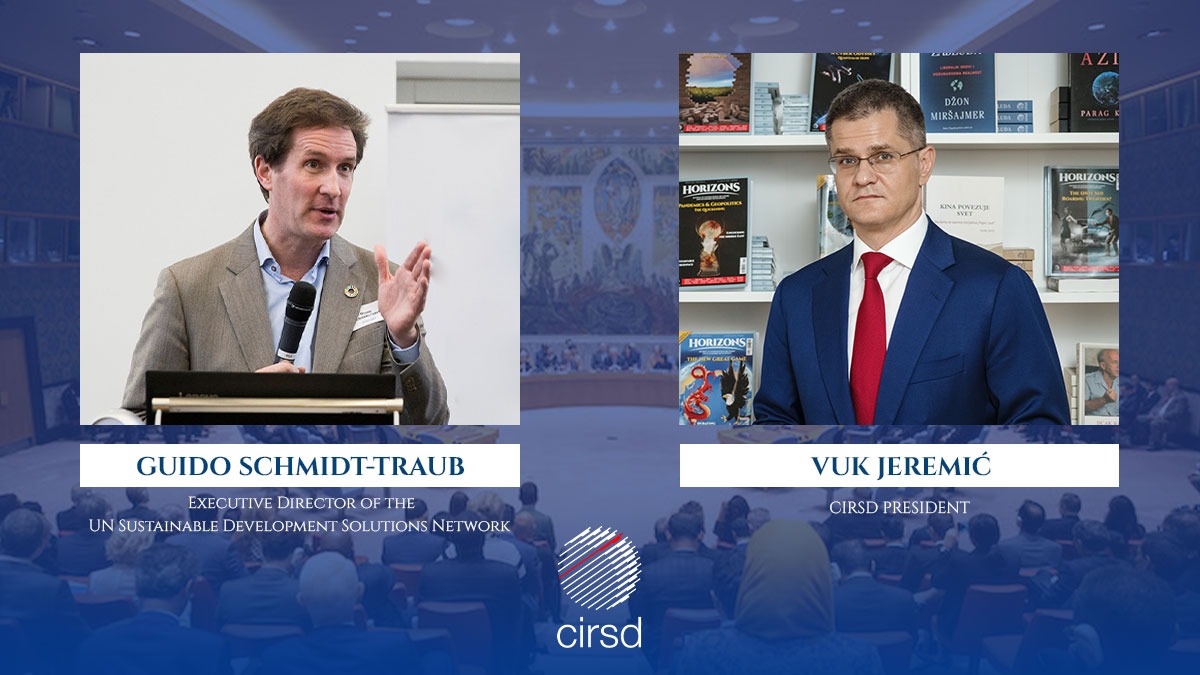European Russophobia and Europe’s Rejection of Peace: A Two-Century Failure
Europe has repeatedly rejected peace with Russia at moments when a negotiated settlement was available, and those rejections have proven profoundly self-defeating. Read more
The president of the Center for International Relations and Sustainable Development (CIRSD), Vuk Jeremić, and the German expert on agro-economics, Guido Schmidt-Traub, agreed that the continuation of the war in Ukraine will almost certainly cause a world crisis in food supply and that the only way to avoid this is to end the conflict as soon as possible.
"The war in Ukraine has deepened the existing crisis in the system of food production and consumption, which is a consequence of the pandemic and reduced incomes, as well as climate change. This has a dramatic impact on agricultural production around the world," said Schmidt-Traub at the lecture. "How will the future reflect on agriculture, food and water", held as part of CIRSD's "Future Leaders" program, whose participants include postgraduate students from all over the world.

Schmidt-Traub, served as the founding executive director of the UN Sustainable Solutions Network, added that the United Nations predicts an outbreak of unrest due to hunger on many continents, and recalled that the "Arab Spring" was preceded by a food crisis, which brought people to the streets, and a few years later led to a large wave of migration to Europe.
"The food crisis will most likely have serious geopolitical consequences, but there is no single 'silver bullet' for solving such complicated problems," Schmidt-Traub said, according to the CIRSD statement.
Schmidt-Traub stated that states that can do so should urgently reduce taxes and inject additional funds not only into the economy, but also into the social security system.
"The food production system has been very successful and the predictions that the world will be ruled by hunger have not come true, because the population will grow exponentially, and food production will grow linearly. Famine was avoided thanks to the progress of the chemical industry and innovations, such as the introduction of the Haber-Bosch cycle for the production of ammonia, which is a key ingredient in artificial fertilizers," Schmidt-Traub said.
Schmidt-Traub pointed out that increased food production, however, further pollutes the environment due to the use of toxic elements and the spilling of nitrogen and phosphorus into the oceans, and increases the greenhouse effect due to deforestation and methane emissions, which are mainly emitted by cows and sheep.
"Unhealthy diets lead to huge health costs, including the diabetes and heart disease pandemics." When you buy a liter of sugary drink, the label says the price, but it doesn't say that the negative effects of that drink are, say, half the price. This means that if you pay one and a half euros for a liter, then the entire 75 cents will have to go to the treatment of negative consequences," said Schmidt-Traub.
Schmidt-Traub pointed out that people all over the world need to pay much more attention to nutrition and eat healthier.
"It is necessary to make agricultural production more efficient by using less land and sea surface, and using less fertilizers. It is a big question in the world and modern science is not yet clear how it can be achieved," said Schmidt-Traub.
Schmidt-Traub stated that some large corporations, such as the British Unilever, are considering ending the production of mayonnaise because there is not enough sunflower oil, and added that there is a shortage of mustard in France, which indicates that the problems could be much greater in the near future.
Jeremić said that he recently spoke with the presidents of several African countries, one of whom is the President of Senegal and currently head of the African Union, Macky Sall, and added that the war in Ukraine caused serious consequences in the supply of food to Africa caused by reduced supply of grain from Ukraine and fertilizer from Russia, among others.
"In September, during the session of the UN General Assembly, the African Union will demand an immediate end to the war in Ukraine and the removal of all obstacles to unhindered trade, because Africa is facing a disaster in food supply," said Jeremić, adding that "the conflicting forces, which are currently guided by different interests than those of the rest of the world, will certainly not like it."
Jeremić, who is also the former president of the UN General Assembly, estimated that one of the consequences of the war in Ukraine will be that Russia and China become even closer partners than before.
"If the geopolitical recession lasts, and now it seems that it will, then many harvests both in Ukraine and in other countries will be victims of geopolitical movements. Geopolitical recession leads to the danger of geopolitical depression, or world war, which would probably involve the use of weapons of mass destruction. The global perspective at the moment is, unfortunately, not bright," concluded Jeremić.